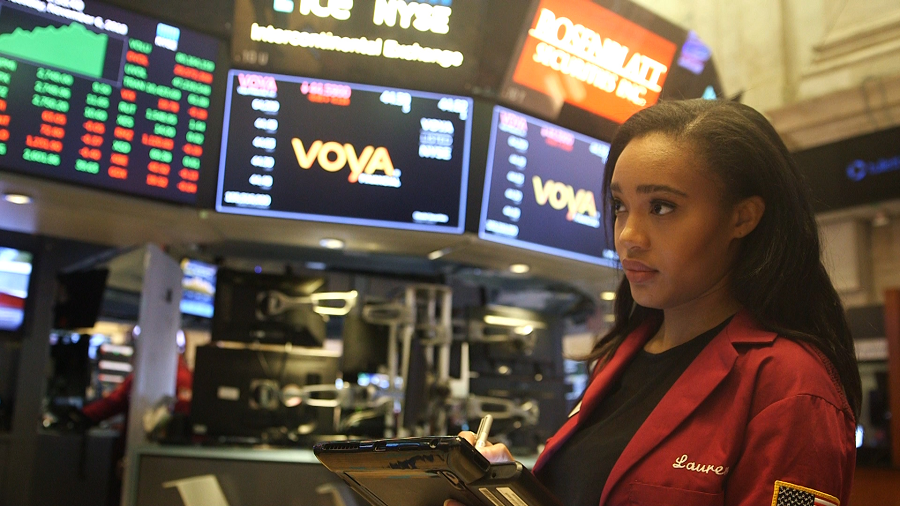It ended up being a very bullish week for U.S. stocks as the major indexes which have been suffering losses for 7 weeks or more, finally posted gains for the week, as investor sentiment shifts mildly bullish.
The New York Stock Exchange (NYSE) All Share Index (ASI) gained a massive 5.71% for the week, bringing its eight-week losing streak to an end. It opened, trading at 15,081.00 basis points and it closed the week trading at 15,942.60 basis points. Of the five trading sessions seen during the week, the NYSE posted gains in four of these sessions, with the bearish session coming on Tuesday. It, however, recorded the highest gains on Friday, a 1.78% gain to end the week.
The NASDAQ also ended its seven-week losing streak as it posted 6.84% gains during the week under consideration. It started at a basis point of 11,396.28 and ended the week at 12,131.13 basis points. The week in question saw a decrease in the volume of transactions against the previous week by 48.49% as the market recorded a volume of 2.72 billion.
The Dow Jones and the S&P 500 also posted gains of 6.25% and 6.58% respectively. The Dow Jones ended its eight-week losing streak while the S&P 500 ended its seven-week losing streak.
What’s moving the market?
The bulls took over the market this week for the first time, since April when the bears took over. The decline in the market had taken the Nasdaq Composite solidly into bear territory and the S&P 500 20% below its record high. The Dow Jones index surged 6.2% for the week to snap an eight-week decline, its longest losing streak since 1932, while the S&P climbed 6.5% and the Nasdaq jumped 6.8%, both ending seven-week slides.
Much of the week’s gains came Thursday and Friday, as stocks rallied with strong retail earnings and a slowing inflation report sparking hopes entering the three-day weekend that the Federal Reserve’s tightening policy can avoid tipping the U.S. economy into a recession. However, the Nasdaq is now 25% below its peak, the S&P off 13% and the Dow down 10%.
Generally, upbeat earnings guidance and solid economic indicators have fueled hopes that the Fed’s hawkish manoeuvres to contain decades-high inflation will not cool the economy into contraction. Data released on Friday showed better-than-expected consumer spending and appeared to confirm that inflation, which has dampened corporate earnings guidance and weighed on investor sentiment, has peaked.
The Federal Reserve minutes of the May meeting gave investors a pretty clear roadmap for the summer. The minutes painted a picture of an FOMC strongly focused on inflation, with rate hikes of 50 basis points in the June and July meetings. But some members also indicated that price pressures may not be getting worse.
The data, combined with the minutes from the central bank’s most recent policy meeting, which reaffirmed its commitment to rein in spiking prices while remaining responsive to economic data, helped boost risk appetite and thus the reason for the bullish performance for the week.
Despite this, there are signs that the U.S. economy is weakening. Of the last 19 major economic indicators, 13 have missed economists’ expectations, Nomura strategist Charlie McElligott noted. The question is whether that will bring about a Fed pause, which stock bulls are hoping for, or will it stiffen the central bank’s resolve.
A grim forecast from Snapchat owner Snap (SNAP) gave investors another excuse to shed tech shares. The company warned of a macro environment that “deteriorated further and faster than we anticipated,” saying it was unlikely to meet its (already conservative) revenue and profit guidance for Q2.
First-quarter earnings season is largely in the bag, with 488 of the companies in the S&P 500 having reported. Of those, 77% have beaten consensus expectations, according to Refinitiv. Of the companies that beat expectations, Ulta Beauty gained 12.5% following its upbeat quarterly earnings report. Computer hardware company Dell Technologies Inc surged 12.9% after beating quarterly profit and revenue estimates. However, Apparel retailers Gap Inc and American Eagle Outfitters trimmed their annual profit forecasts. The latter dropped 6.6%, while the former rebounded and ended up 4.3%. Trading volumes were light ahead of the long weekend, with U.S. stock markets closed on Monday in observance of Memorial Day.
In other economies, the UK introduced a 25% windfall oil and gas tax. Prime Minister Boris Johnson’s Conservative government became the first to put into action an argument that the energy industry has profited too much from a surge in commodity prices that are stoking inflation. About 5 billion pounds is expected to be raised, which will finance a one-time payment of 650 pounds to about 8M of the poorest households.
Top 5 Gainers
Here is a look at the notable gainers for the week. They include:
- Blacksky Technology Inc (BKSY) 101.54%
- Apyx Medical Corp (APYX) 78.13%
- Lixiang Education Holding CO ADR (LXEH) 71.50%
- Tabula Rasa Healthcare Inc (TRHC) 67.83%
- Soundhound Ai Inc Cl A (SOUN) 65.14%
Top 5 Losers
- Verrica Pharmaceuticals Inc (VRCA) -66.33%
- Iovance Biotherapeutics Inc (IOVA) -54.50%
- Springworks Therapeutics Inc (SWTX) -50.63%
- Bigbear.Ai Holdings Inc (BBAI) -46.20%
- Mirati Therapeutics (MRTX) -37.16%
